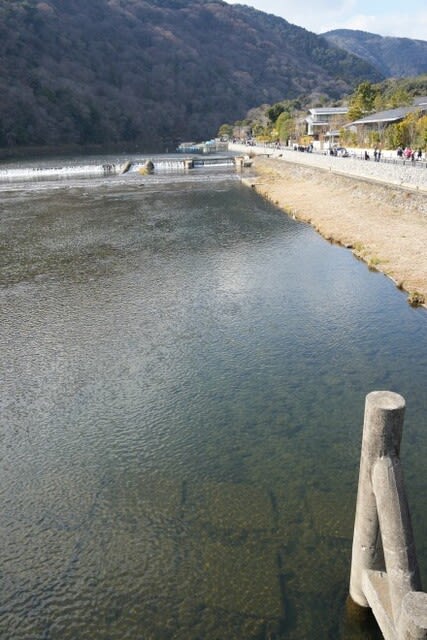It is no exaggeration to say that Arashiyama is my home garden.
After all, several years ago, I spent 100 days a year photographing spring, summer, fall, and winter in Arashiyama.
I often go there on New Year's Day.
Today was no different.
I was lucky enough to be seated in a four-seater from Kyoto Station.
I was reading the February issue of the monthly magazine Sound Arguments, which went on sale yesterday.
It featured an interview between Ms. Sakurai and Mr. Oda at the beginning of the issue.
As I was reading, I almost cried.
Ms. Sakurai said, "I almost cried listening to it."
It is a must-read not only for the people of Japan but for people all over the world.
Recently, I have often left out reading the monthly magazine "Sound Arguments."
Japanese citizens who can read the printed word must buy this month's issue at their nearest bookstore and read it carefully during the New Year vacations.
The emphasis in the text other than the headline is mine.
Japan, Wake Up! Restore the Spirit of Public Service!
Kunio Oda, Special Professor at Reitaku University and former Air Force General, and journalist Yoshiko Sakurai
-Congratulations to Mr. Oda on winning the 38th "Sound Arguments Award."
The decision to award the prize was unanimous among the judges.
It is a happy thing to serve one's country.
Oda.
It is my responsibility as a former Self-Defense Force officer.
As I wrote in the Sankei Shimbun's "Sound Arguments" column the other day, in an international public opinion poll, the percentage of people who answered "yes" to the question, "If a war breaks out, would you fight for your country?" At 13.2%, it was by far the lowest among the 79 countries surveyed.
Lithuania, which came in second from the bottom, had more than 32%, more than double the percentage in Japan.
I am currently teaching security at a university, and what I say is very fresh in the minds of my students.
Although security is rarely discussed in public, the international situation surrounding Japan is severe, and students wonder if Japan is safe.
That is why they listen to my lectures with a twinkle in their eyes.
And after the lecture, students would come up to me and whisper, "I will fight if push comes to shove."
Sakurai.
They have to say that out loud (laughs).
Oda.
They can't say it out loud, can they?
Even in the middle of a lecture, I think it is normal for them to raise their hands and say, "Japan may be the last among 79 countries, but I am not! I think it is normal for them to say, "Japan may be the last among 79 countries, but I am not!
Even in the middle of a lecture, I think it's normal to raise your hand and say, "Japan may be out of the 79 countries, but I'm different!"
After all, there is a distortion of the language space peculiar to Japan.
After 35 years of fighting on the front lines of defense, it is my mission to break through these obstacles one by one.
Sakurai
It may be that we are not familiar with military affairs, but I think there is also the problem that the sense of national presence has become weak since the end of World War II.
The idea of giving one's life for one's country has been lost, and people have come to find the meaning of life in things as trivial as working hard for a company.
In postwar Japan, even looking at the Constitution, the state has no role to play.
The preamble of the Constitution states that the government does not have to do anything.
As for the military, which is the nation's foundation, Article 9, Paragraph 2 states that Japan shall not maintain land, naval, air, or other military forces, and the right of belligerency is not recognized.
The Constitution commands the nation to leave the protection of its citizens to the international community.
The foundation of the country after the war has been distorted.
Oda
Thomas Jefferson, the third president of the United States, said, "The most effective national defense is a well-educated citizenry."
I have served in the Self-Defense Forces for 35 years, and I understand this very well.
I am often asked what it is like to be educated in the Self-Defense Forces.
I say that it is the "revival of the public."
In school education and general society today, the "private" takes precedence, and the nation's and society's importance is neglected.
On the other hand, the first oath that Self-Defense Force personnel take when they put on their uniforms is the spirit of altruism, which states, "In the face of danger, do not be afraid to take risks.
They do their utmost to serve the people, even sometimes risking their own lives.
It is the exact opposite of the Japan Teachers Union's education.
It is what awakens the young people who join the Self-Defense Forces.
Japanese people are supposed to have a DNA of "altruism" rooted in ancient traditions, but it is sealed up in school education.
So we are trying to nip that DNA in the bud.
The sparkle in their eyes is different when they realize how happy and comfortable it is to serve others, society, and their country.
Look at the sparkle in the eyes of the SDF officers who go out on disaster relief missions.
Of course, there are some strange people among SDF personnel, but according to the "White Paper on Crime," the percentage of SDF personnel committing crimes is only about one-tenth of that of civilians.
The education of the JSDF is generally successful because it awakens the soul and DNA of the Japanese people, which had been suppressed until then.
This article continues.

2023/1/1 at Arashiyama



















